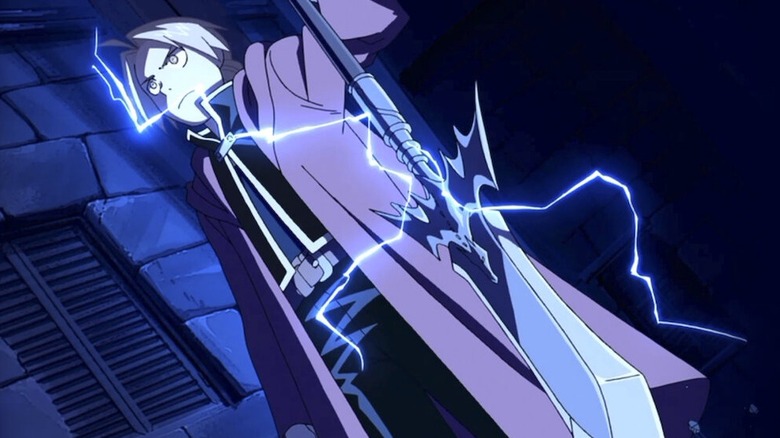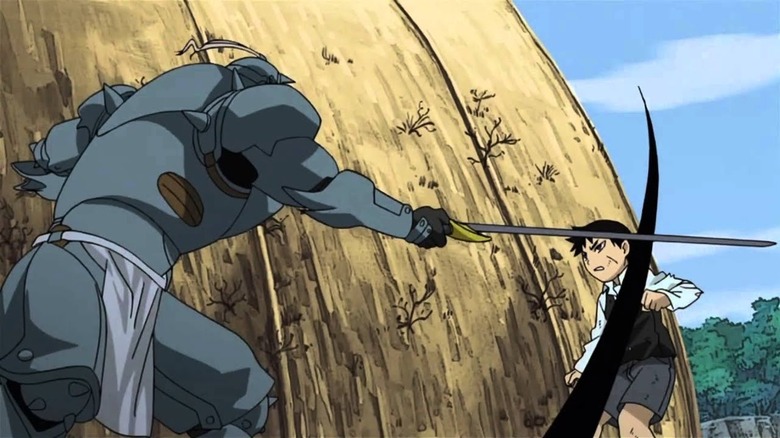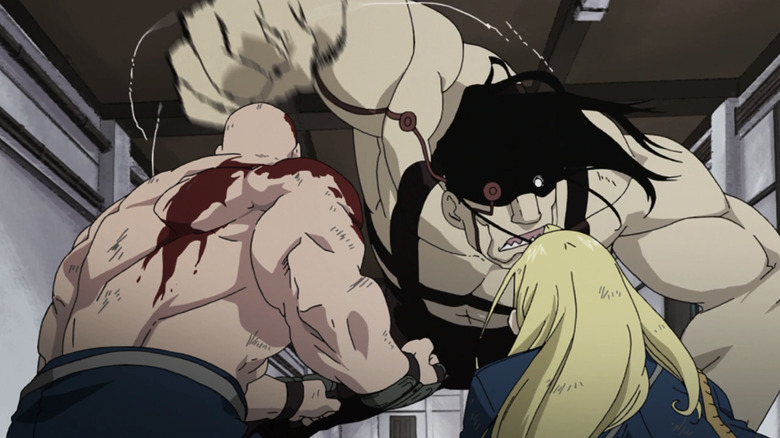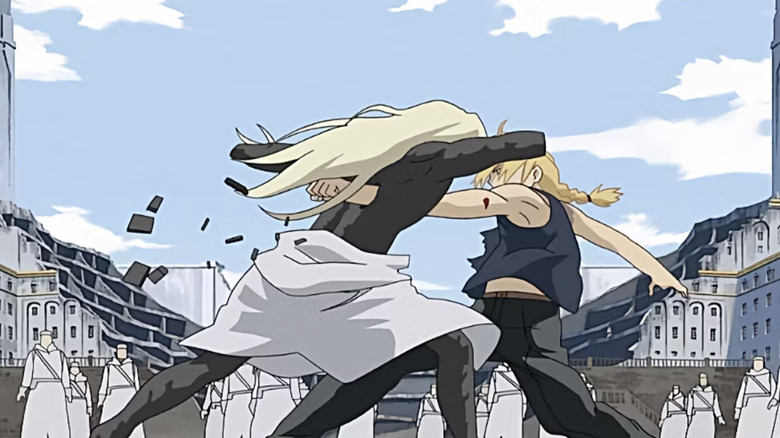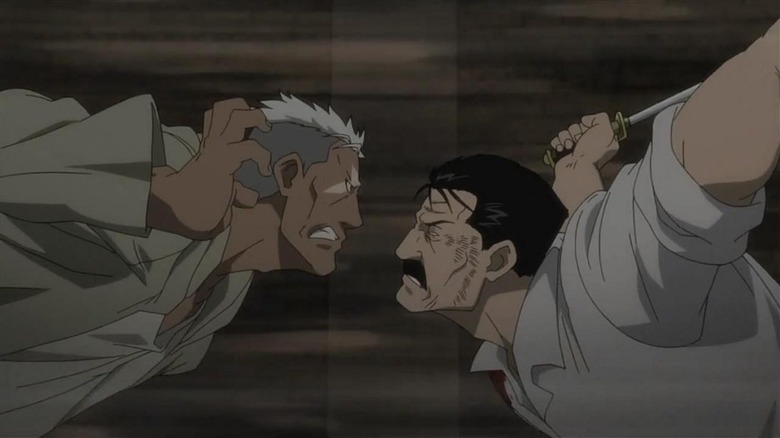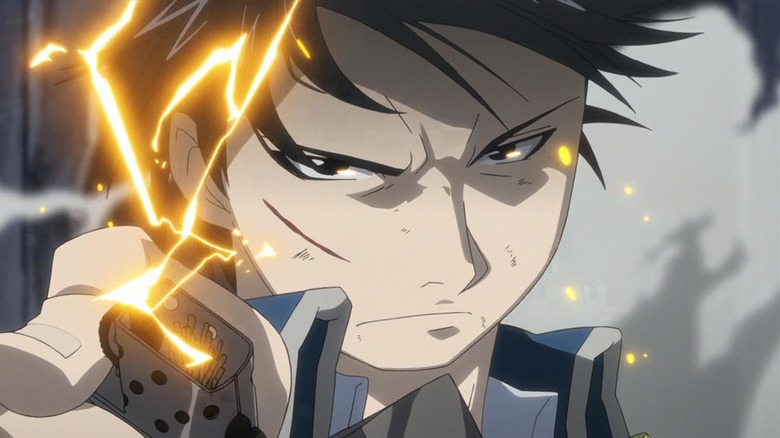5 Best Action Scenes In Fullmetal Alchemist: Brotherhood, Ranked
"Fullmetal Alchemist: Brotherhood" has turned 15 years old. Debuting in 2009, it was the second (and more faithful) anime adaptation of the original manga by Hiromu Arakawa. It's one of the best anime of its decade and genre (battle shonen) too. For as much stock as you can put in fan community rankings, "Brotherhood" maintained the #1 spot on MyAnimeList for years and was only recently dethroned by 2023's breakout hit, "Frieren: Beyond Journey's End."
"Neon Genesis Evangelion" and "Cowboy Bebop" first converted me to anime, while I admit I watched the 2003 "Fullmetal Alchemist" first. Still, I'd say "Fullmetal Alchemist: Brotherhood" is what made me an anime fan, not just an occasional admirer. It's one of the most satisfying experiences I've ever had with a TV series (I watched the last 13 episodes in a single sitting) and the high I've been chasing with anime since.
"Fullmetal Alchemist" is different from many other shonen (young boys) anime/manga. It has a lot on its mind, for one, exploring the conflict between science and faith, how fascists believe they can only be free by controlling others, and how one measures the value of human life. The series ends with Edward Elric not having attained some vague goal to be the very best, but with him learning humility and accepting how little he actually knows.
It's also a story that's kept making me think years after I first experienced it. If we're being real, though, "Fullmetal Alchemist" is ultimately an action story — and a damn fine one. Arakawa's drawings are flawlessly infused with color, motion, and sound by "Brotherhood" series director Yasuhiro Irie and co. You can only appreciate "Fullmetal Alchemist" by watching it whole, but dang there are many action bits I'll watch again and again in bite-sized chunks.
Here are the five very best action scenes in "Fullmetal Alchemist: Brotherhood."
5. Alphonse vs Pride and Kimblee
This isn't the most consequential fight, but it's one of the most beautifully-realized. Episode 51, "The Immortal Legion," ends with Alphonse Elric choosing to use the alchemy-enhancing Philosopher's Stone to face the Homunculus Pride and the explosion-generating "Crimson Alchemist" Solf J. Kimblee.
Episode 52, "Combined Strength," follows the unfolding battle, and it's the series' best demonstration of alchemy's prowess in hand-to-hand combat. Episode animation directors Satoshi Ishino and Kenichi Ōnuki keep the characters and audience on their feet in a battle of lightning-fast reactions pitted against one another.
All three fighters keep moving and adapting to their opponent's attacks, but Al's reflexes are the quickest of all. Pride slices off one of his armored body's arms? He generates a new one with the Stone and transmutes the amputated one into a sword. Kimblee ignites an explosion beneath his feet? In the blink of an eye, he creates a serpent-shaped battering ram to carry him from the explosion and strike back.
Alchemy is the science of change and this counter-after-counter struggle is one battle that evolves a lot in a mere 60 seconds.
4. The Armstrong and Curtis families vs Sloth
While Al is fighting his own battle, several of the other heroes face off with Pride's homunculus sibling, the Hulk-sized Sloth. This one unfolds in chunks over five episodes, spilling into episode 54, "Beyond the Inferno," and episode 55, "The Adults' Way of Life." (For reference, the last arc of "Fullmetal Alchemist" takes place over a single day.)
Sloth's first foes are General Olivier Armstrong and her brother, Major Alex Armstrong. Olivier may not have her brother's alchemy or muscles, but this ice queen doesn't need them. Unlike the previous fight, this one is not a clash of fast-thinking equals, but an attempt to win a battle of attrition against an immovable force. The Armstrongs keep striking back against Sloth but while his mind is slow, his body isn't. He's strong and durable too, deflecting everything from bullets to Alex's fists.
As the battle rages on, Alex and Olivier get progressively bloodier while Sloth's injuries keep healing. The violence in "Fullmetal Alchemist" is often more gruesome than an action anime of its age demographic; take this memorable shot where Alex transmutes an enormous stone spike from the wall to pierce Sloth's head and incoming punch.
The tide is only turned when alchemist Izumi Curtis (the only woman in Amestris tougher than Olivier) and her body-builder husband Sig (the only man stronger than Alex) show up. Once they do, the fight goes from desperate to downright funny (clock the Armstrongs' bewildered reactions to the Curtises' sheer awesomeness).
Now four against one, Sloth finally falls to Alex and Sig's combined punch (though not before they have a muscle-flexing contest mid-battle). It's a theatrical conclusion, but Alex Louis Armstrong has always been a character who loved showing off.
3. Edward and friends defeat Father
The final battle of "Fullmetal Alchemist: Brotherhood" is mostly shown in episode 62, "A Fierce Counterattack," before concluding in episode 63, "The Other Side of the Gateway."
The first Homunculus, and Father of the ones named for Seven Deadly Sins, has absorbed the power of God; the knowledge contained within the combined soul of Earth and Heaven. He struggles to contain it, though, and our heroes fight as one, throwing everything at him to wear him out.
The turning point of the battle is Al sacrificing himself. After Father destroys Ed's robotic right arm, leaving him helpless, Al reverses the human transmutation Ed did long ago (sacrificing his arm to bind Al's soul to the armor) to give his brother a fighting chance. With no time to mourn, Ed puts his fury at the loss of his brother into his fight; the visceral money shot (animated by Tomokatsu Nagasaku, Jun Shibata, and Satoshi Ishino) shows him pulling out rebar lodged into his shoulder, the frame zooming in first on his face then the shoulder to capture the gory details of his reactions. A rapturous zoom-out happens again when Ed claps his hands together to transmute, the initial close-up of his face pulling back to show the stone columns rushing at Father.
The fight admittedly becomes a simple slugfest at this point, but the ending is perfect. Earlier in the series, Edward fought the Homunculus Greed, who could make his skin diamond-hard; Edward used his knowledge of alchemy to turn Greed's armor into fragile graphite. Now, Greed (who has since joined the heroes) lets Father absorb his soul so he can turn his old man's skin into graphite, sacrificing himself so Ed can deal a final blow.
Yes, in the end, alchemy is what saves the day.
2. Scar defeats Wrath
How does a battle between two characters who've never met each other before become the most emotional in the series? That's the genius of "Fullmetal Alchemist: Brotherhood" (specifically episode 59, "Lost Light," to episode 61, "He Who Would Swallow God").
On one hand, Scar, a vigilante belonging to the Ishvalan race (who were slaughtered by the Amestrian military). On the other, Führer King Bradley — truthfully the homunculus Wrath — who carried out the genocide of Scar's people. This isn't a battle of revenge, though. Scar, left with nothing after the Ishvalan genocide, was driven only to kill and survive just like Bradley, but a series' worth of development has pushed him to channel his anger into a positive flow, not a negative one. Bradley is his perfect foil; it's not a coincidence that Scar's final test is to defeat a man who personifies the sin of Wrath.
The build-up to the fight is exquisite, with Bradley delivering a monologue about the purity of battle before he and Scar clash; he uses dual swords, Scar his fists (helped by the alchemy tattoos on both his forearms). Bradley has the clear upper hand, speeding across Scar's alchemic stone creations and slicing his flesh; similar to the soon-to-come fight between Edward and Father, the framing uses quick zooms and close-ups to emphasize mid-battle movement and reactions, from Wrath slamming his sword down to Scar launching an alchemic barrage across the room. You won't be focused solely on the animation though; Wrath's taunts to Scar about how he's abandoned his God for alchemy (expertly played by the late Ed Blaylock in the English dub) are chilling. While Scar has embraced an alchemist's ability to reconstruct the world, it's his old destructive abilities that finally do in Bradley.
1. Colonel Roy Mustang incinerates Lust
There are a lot of "S**t just got real" moments in "Fullmetal Alchemist: Brotherhood," but if there's one that stands just slightly higher than the others, it's episode 19, "Death of the Undying." Colonel Roy Mustang, the Flame Alchemist, puts his fiery talents to good use and incinerates the homunculus Lust, saving both his lieutenant Riza Hawkeye and Alphonse from her Ultimate Spear.
/Film included Mustang's fiery execution of Lust as one of the greatest anime fights of all time, with good reason. It's a pretty one-sided fight, admittedly (Mustang continuously attacks Lust with explosive flames before she can react, burning through her healing ability), but evened by the circumstances. Roy has been stabbed by Lust and had to not only cauterize his wound but cut a Flame Alchemy transmutation circle into the skin on his hand. Even Lust is impressed he can look at her without any hint of pain in his cold eyes, let alone stand.
Again, the action in "Fullmetal Alchemist" stands out in part due to the pinch of horror added in. Episode director/storyboarder Shinji Ishihira shows all the grisly burns as Lust is burnt alive, including a lingering shot of her skeletal silhouette withering within the flames. The sound design is the other key ingredient; Kikuko Inoue and Laura Bailey's screams as Lust in both Japanese and English sound like genuine agony, while Akira Senju's music score works in percussive harmony with the explosions.
"All is one, one is all" is part of the narrative's philosophy in "Fullmetal Alchemist: Brotherhood." The series' craftsmanship is just as intermingled and unforgettable episodes like "Death of the Undying" are the result.
